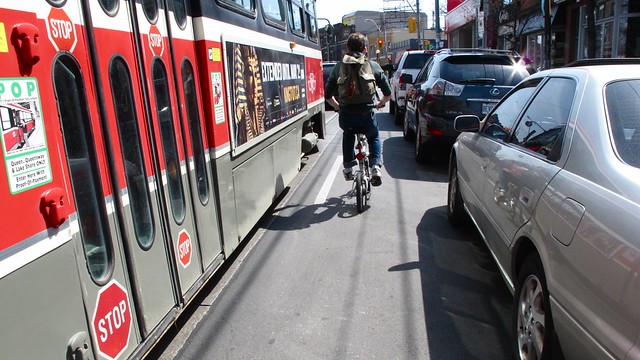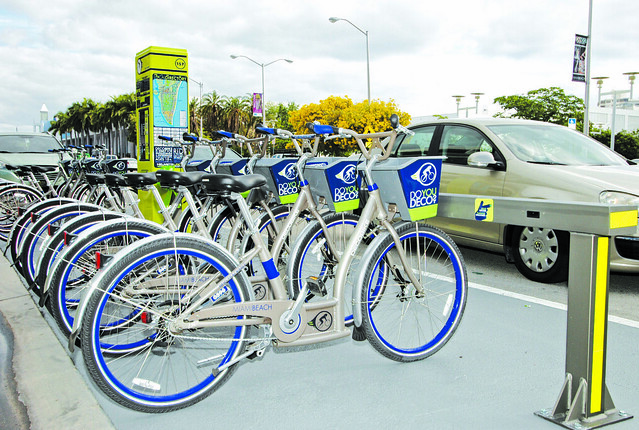 ©Door Prize Central
©Door Prize Central
15 years ago ago by 'Xander @416cyclestyle.
Councillors Adam Vaughan and Gord Perks are both downtown progressive politicians who are interested in livable communities and pedestrian-friendly streets. Both are white men still in their prime, who, I believe, are occasional cyclists. Like many in this category they feel that they know enough about cycling on Toronto streets, and they are just cocksure enough, that they feel that they can make judgements on the needs of the diversity of regular cyclists, without needing to consult them. There are still a number of people in power who can't see beyond their own cycling experiences to consider what it might mean to cycle in this city if you're not quite as able, young (or too young), white, and masculine.
Turns out even progressive councillors like Adam Vaughan and Gord Perks give little thought to how they would improve cycling in Toronto's core. Perks has shown his support for Vaughan's wish to turn Richmond Street from one-way to two-way traffic. In a letter I've obtained from Councillor Perks to a constituent, Perks says:
[the bike union's] endorsement of this project concerns me. The project has its origins in the previous term when it was used as an excuse by some traditionally anti-bike lane Councillors to oppose the separated lane proposed for University Avenue. Instead of supporting a proposal which would have been in place last summer they argued for looking at other routes in the future. The proposal creates some specific problems for local plans in the area such as making Richmond St. into a two-way more pedestrian friendly street.
Additionally it is part of the ongoing effort supported by the mayor to push cyclists off the main streets in the City and onto side streets.
We haven't heard a peep from either of Perks or Vaughan if they have any plans to follow through with the official Bike Plan, which calls for bike lanes on Richmond and/or Adelaide. It's not only from Ford Nation that we have to worry about killing the Bike Plan, it seems like these two are helping it along by quietly ignoring it. If Vaughan and Perks don't want to provide for safer bike traffic on Richmond, just where would they like to put them all? Where will the cyclists get their long-promised safe bike routes? There is no other politically feasible route in the downtown, which is clearly shown in the work that the transportation planners did for the Bike Plan.
I think bike lanes on University would have been great. But it would have been only an alternative to St. George / Beverly and it's not clear to me that cyclists actually need to choose between one or the other. The separated bike lane plan was proposed in full yet again this year, when it's no longer important to "kill" University bike lanes. Doesn't it seem weird that a right-wing politician would propose separated bike lanes on Sherbourne, Richmond, St. George, Wellington and Harbord just to kill University? He'd be "sacrificing" a lot more than he'd be saving for motorists, if that were his only motivation.
Perks insinuates that the bike union didn't support the University bike lanes. He's wrong. Yvonne at the time said this:
"Certainly physically separated bike lanes are the most effective at providing safe spaces for cyclists to ride," she said. "That certainly stops cyclists from having to jut around a parked car. It's a step in the right direction and I'm glad to see the city is piloting this."
It's surprising that Perks references "local plans" for making Richmond two-way pedestrian-friendly street. If the comment by Adam Vaughan on this blog can be believed, Vaughan seemed to take a step back: "The reason I frame the debate with the phrase two-way is so that the idea gets attention, The assumption is one way streets work." So it seems to me that there is no "local plan", it is still merely at the stage where Vaughan is musing loudly, and where Perks feels the need to support Vaughan's musings.
Richmond is hardly a "side street". The opportunity for a major downtown thoroughfare to become much friendlier for cyclists and pedestrians is just too great to just cave into a politician's musings. It's been proven that separated bike lanes reduce motor traffic speeds; provide comfort and safety to cyclists; provide buffers for pedestrians from cars; and reduce injuries and crashes (Exhibit A: Prospect Park West Bike Path).
Even if the mayor has officially proposed taking cyclists off the streets, this proposal didn't come from the mayor. It never would have occurred to him to put separated bike lanes on all these major cycling routes through Toronto. And if he did, would Ford still be considered "anti-cycling"? And more to the point, if Vaughan and Perks oppose the entire separated bike lane network because Vaughan prefers two-way traffic on Richmond, are they still considered "pro-cycling"?


